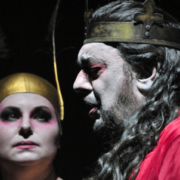“Be Cheerful sir, “ cried Prospero, “our revels are now ended…” – Parable of the Tempest (Shakespeare)
It is said that the wind that scattered the Spanish Armada blew English literature. In a sudden release of magical energy, into a nation in flower, a love that raged like fever — it was fragrant like a May morning. Words, magnificent words of power, it was like some magic incantation wrapped in the richness of vocabulary. It was that what made Shakespeare a phenomenon, who had such words that turned poetry into something a man could drink them on illuminating the whole scene. It could be miseries, cruelties and all, that can linger to this day — be it an Elizabethan song, a speech by Hamlet or Anthony, Cleopatra and the rest of his characters.
Yet before that age properly declared itself, the prose of Shakespeare in his early comedies were said the be too enervated, bloodless, and narrow in its appeal. But down the centuries, Shakespeare has been compared with nature. It is a tribute to his fertility, his vast range, the breadth and depths of his sympathy in which he excels all other writers.
He went down into the depths, hung over abysses until it was too close to madness, or reached heights of joy, tenderness and love. Such was Hamlet’s dissolution, Macbeth’s despair and Lear’s madness and the mighty Julius Caesar. He also tried his golden Maytime in which a “Midsummer Night’s Dream” was his finest flower only to later swing to its opposites, giving vitality to his rebels, rogues, misfits and failures: the kings who did not succeed the great Falstaff, whose every action and word mocked and defy order and conformity.
Hamlet, is a man desperately trying to find a man’s balance, who is far more intensely aware of both good and evil than anyone near him. Yet he cannot act because he is no longer in a world where decisive action is possible, except on blind impulse evil rises, like a black fog and stench, from unknown depths and descends in a world out of the hands of God. Love is transformed in this murky atmosphere, into lust, treachery, disease , filth, and abomination. The tragic victims — Hamlet, Othello, Macbeth and Lear — different as they are to their doom, are all without any balance.
With life terribly divided between the opposite with chaos conquering, disharmony triumphant; Lear recovers from his madness to be on the other side, beyond the storm. The wonderful Anthony and Cleopatra, like some moral tale when showing how middle aged passion, lust and folly with immortal words for longings transforms into into love, the dying wanton queen cries “Husband here I come!”
The closely knit parable of the Tempest bidding farewell to the magic of the island, Shakespeare says (to his theatrical genius, to the world and to us in the most famous speech in literature) “Be cheerful sir,” cried Prospero. “Our revels are now ended.”
Shakespeare, though he takes us as far as human imagination can reach, always come home. The balance is restored. Life, ordinary sensible life, in which it is best to be cheerful – goes on.
Though he conjures up everything from lyrical young love and gossamer fairyland to darkest withchcraft and bloody murder, he always leads us home. It is no wonder that the millions of men and women through all the changing fashions of literature, have kept not only greatest admiration, but their deepest affection for Shakespeare.
Meanwhile, last night at the LA Opera, in his latest baritone expression in another Verdi epic “Macbeth” by Placido Domingo, we asked what drew him to the role. He replied, it was actually the third production in a row, having done it one in Berlin and then in Valencia, Spain.
He said it was an extraordinary work, even as a villain, because he sees Macbeth as a victim of his wife and thirst for power, and according to his director Darko, more dramatic, as operas are.






